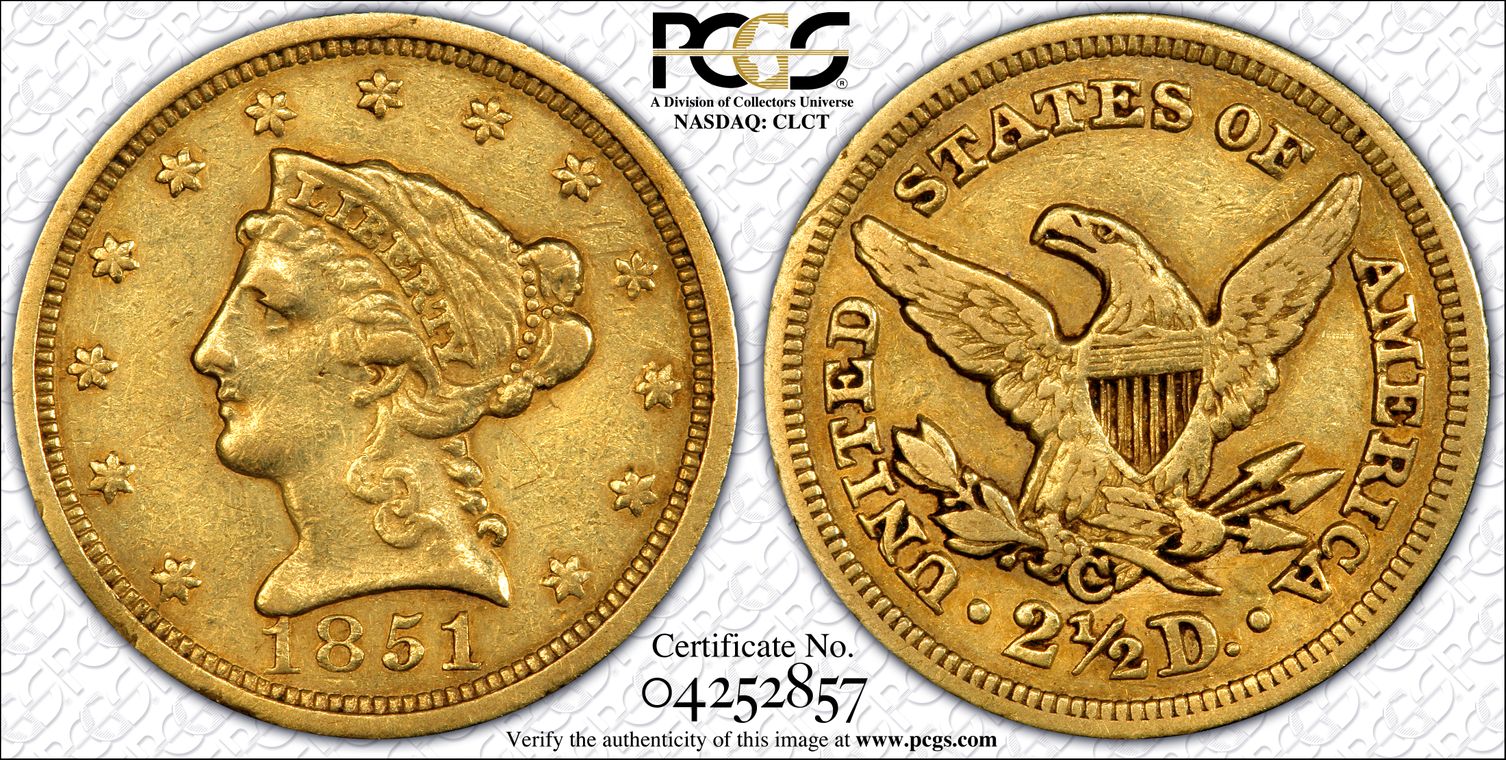1851-C $2.50 XF40 认证号04252857, PCGS号7760
专家评论
Doug Winter
The mintage for the 1851-C quarter eagle is considerably larger than for the 1850-C. Despite this, the 1851-C is a slightly scarcer coin, both overall and in higher grades.The 1851-C quarter eagle is most often seen in VF and EF grade. It is very scarce in properly grade AU. As recently as two decades ago the 1851-C was believed to be unique in Uncirculated but a few previously unknown pieces have entered the market, and there are now four to six that qualify as Uncirculated by today’s more liberal standards.
STRIKE: The quality of the strike for this issue varies. There are some examples known with a good overall strike while others show below average to poor strikes. On even the sharpest examples, there is weakness on the hair below RTY in LIBERTY. Other examples show flatness on Liberty’s hair bun. A number of 1851-C quarter eagles are very weak at the top of the hair, due to either a clogged die or a piece of foreign material adhering to the die during the striking process. The reverse is better struck. Most of the details on the wings and the neck are sharp while there is often just minor weakness seen on the eagle’s right leg and on the claws.
SURFACES: This date is almost never seen with choice surfaces. Most examples are noticeably abraded in the fields and show evidence of having been roughly handled. The circulation marks are compounded by a number of production factors as well. Clashmarks, which range from light to heavy, are seen below the arrowheads, around the neck of the eagle and outside of the center of the wings. I have seen at least five or six examples that have deep mint-made parallel scratches on the face of Liberty. These resemble adjustment marks and their exact cause is not known. The grading services typically net grade 1851-C quarter eagles that show these scratches as they tend to detract from the appearance of the coin.
LUSTER: The luster is satiny with a somewhat grainy texture. It is very hard to locate an 1851-C with original mint luster since most survivors have been cleaned or processed. On the few that are original, the quality of the luster is below average.
COLORATION: The natural coloration of this date is light to medium green-gold. Most have an unnatural bright appearance due to having been cleaned or dipped. Original pieces are worth a substantial premium die to their scarcity.
EYE APPEAL: It is very hard to find an example with good eye appeal. This date is a bit more available in higher grades (AU55 and above) than previously believed but the typical coin is well worn and unappealing.
DIE CHARACTERISTICS: Raised die scratches can be seen on the reverse from the middle of the olive leaves up into the field.
DIE VARIETIES: There is a single variety.
Variety 1 (formerly Variety 13-G): The first 1 in the date touches both the bust and the denticles while the second 1 is much closer to the denticles than the bust. The reverse is the same as described above for the 1849 and for the first variety of 1850.
David Akers (1975/88)
Very difficult to locate in high grade and, as the auction data clearly indicates, most of the available pieces grade VF or less. Most specimens of this date are fairly well struck on the reverse, but are typically weak in the hair over Liberty's ear.PCGS #
7760
设计师
Christian Gobrecht
边缘
Reeded
直径
18.00 毫米
重量
4.18 克
铸币数量
14923
金属成分
90% Gold, 10% Copper
更高评级数量
77
评级较低的钱币数量
27
地区
The United States of America
价格指南
PCGS 数量报告
拍卖 - PCGS 评级的
拍卖 - NGC 评级的
稀有性和存量估计 了解更多
| 所有评级 | 125 |
| 60或以上 | 7 |
| 65或以上 | 0 |
| 所有评级 | R-7.7 |
| 60或以上 | R-9.6 |
| 65或以上 | R-10.1 |
| 所有评级 | 48 / 147 TIE |
| 60或以上 | 43 / 147 TIE |
| 65或以上 | 1 / 147 |
| 所有评级 | 48 / 147 TIE |
| 60或以上 | 43 / 147 TIE |
| 65或以上 | 1 / 147 |






















